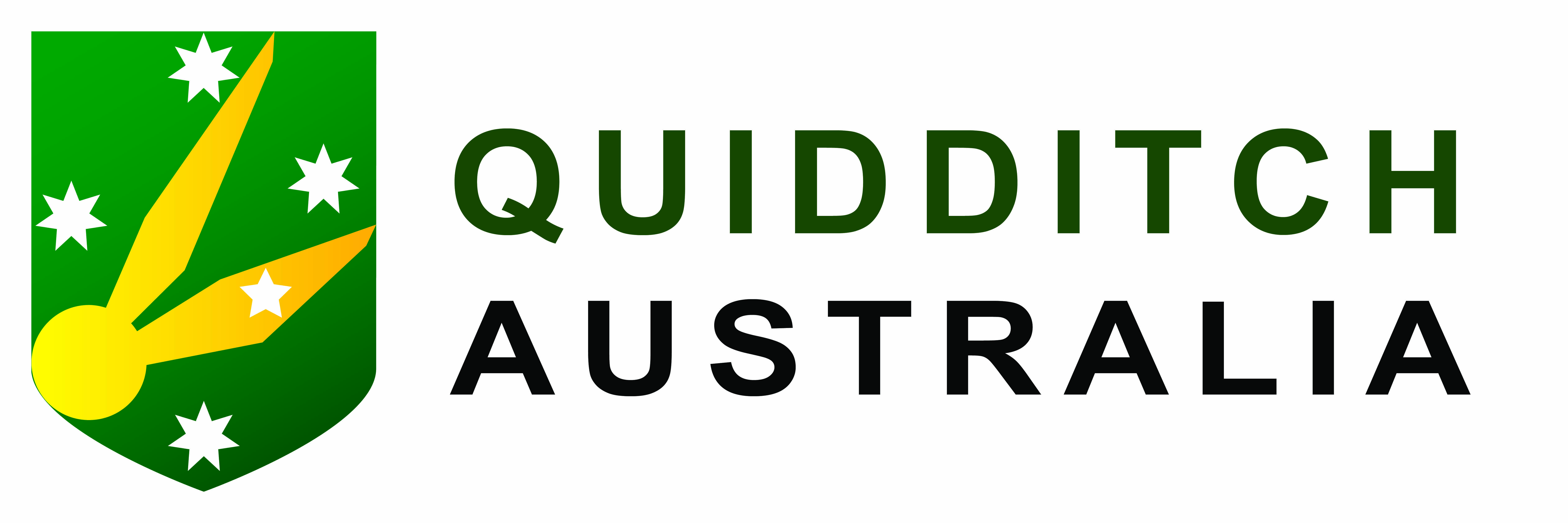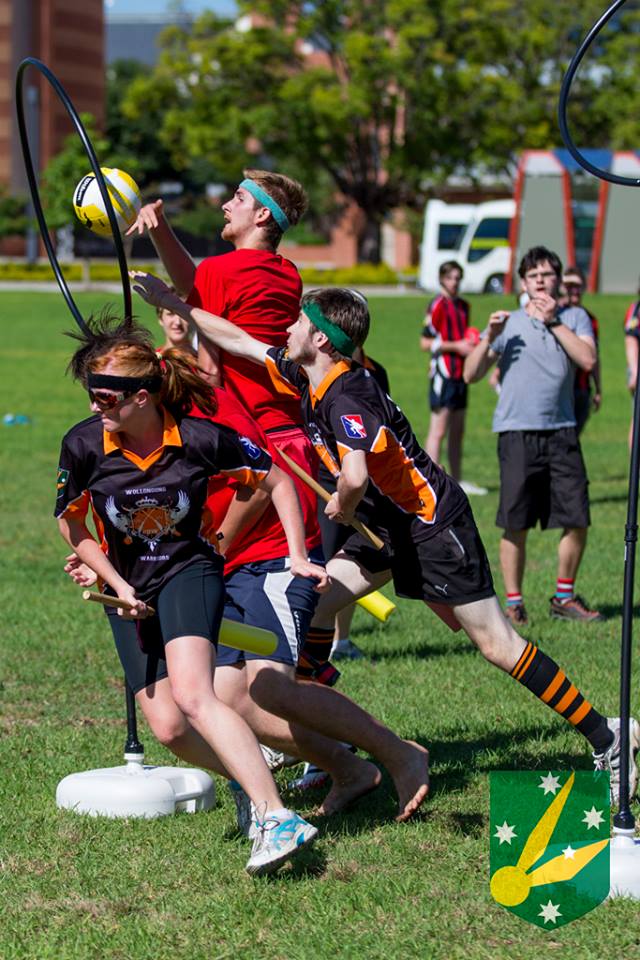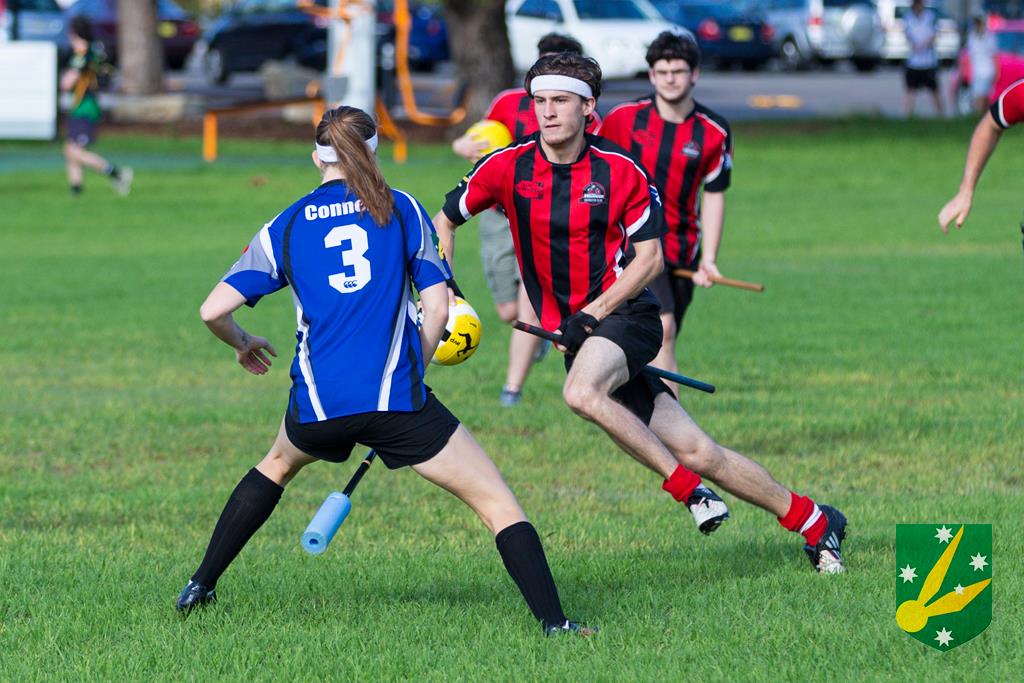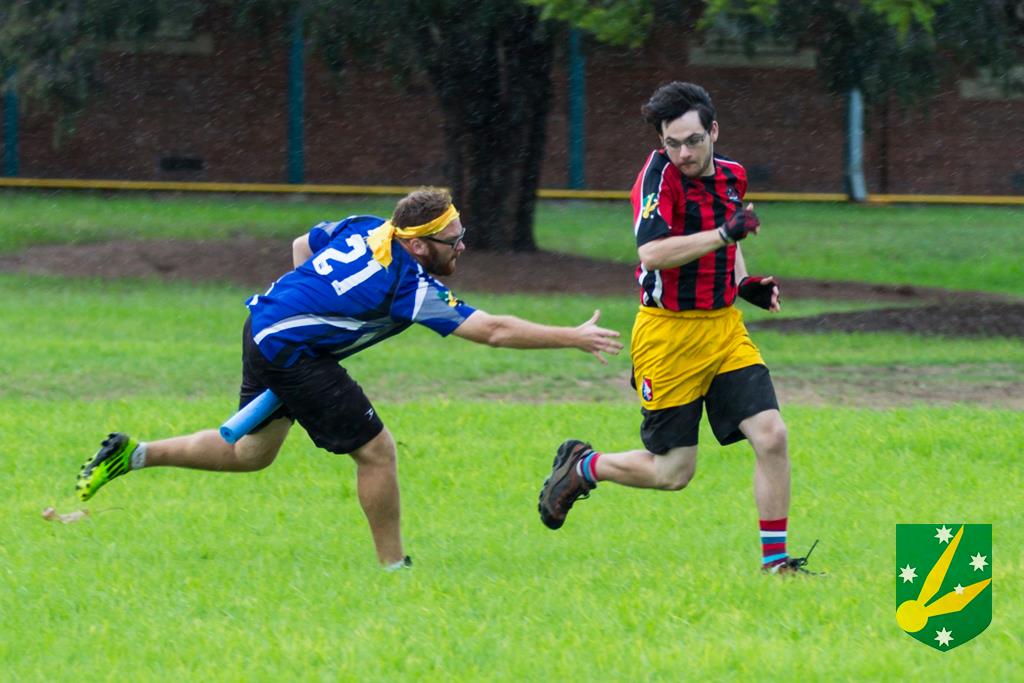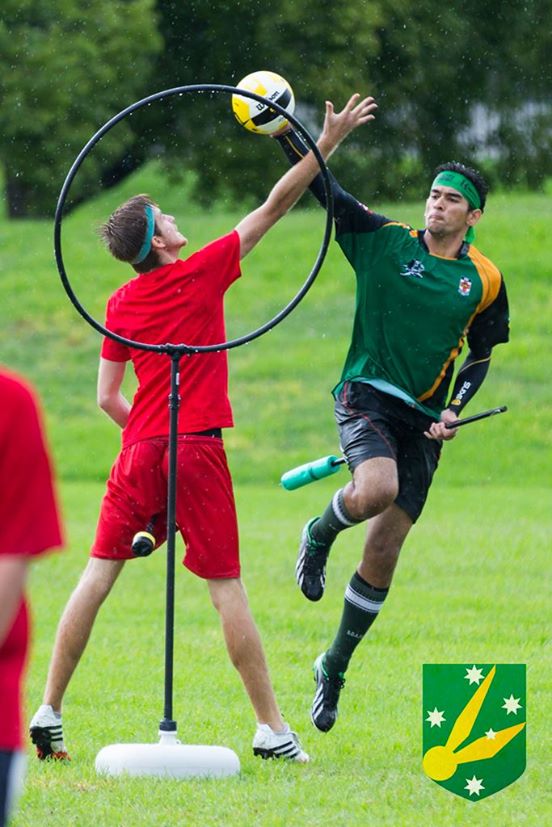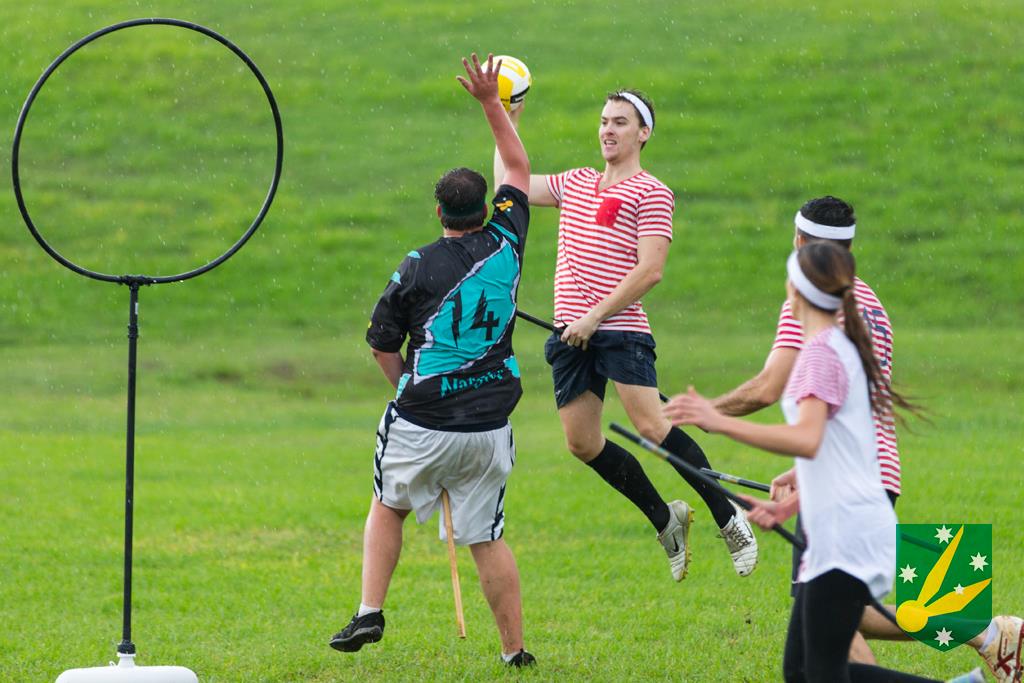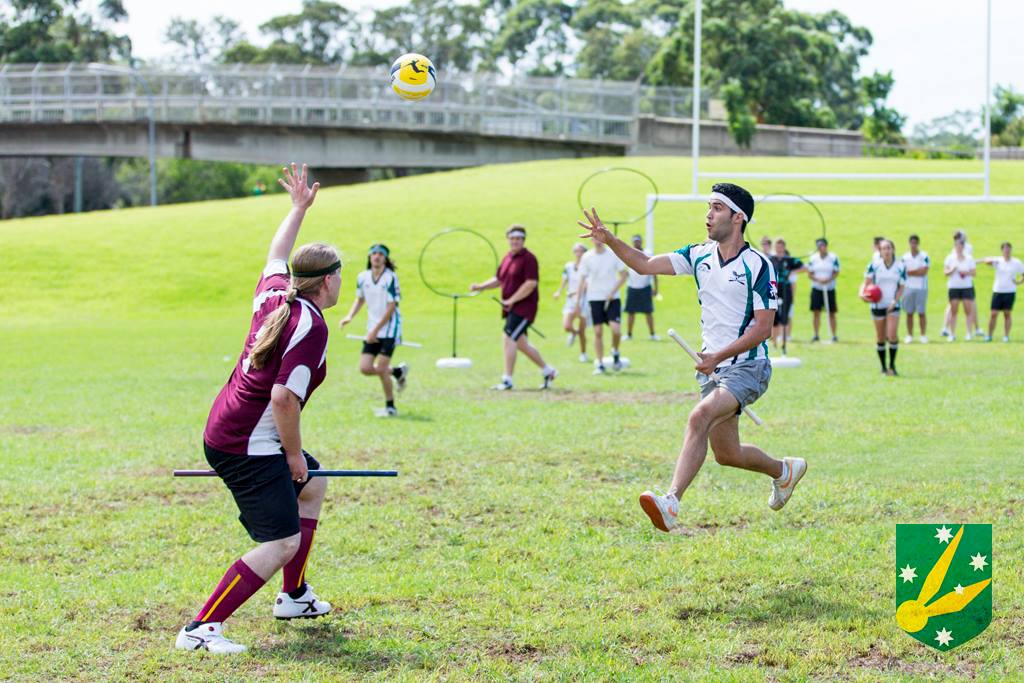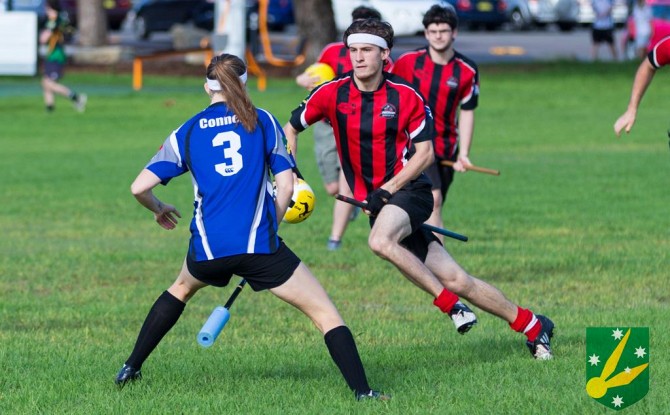
March Triwizard Report
After more than three months of intensive soul-searching and celebration alike for all New South Wales quidkids after the delirium of QUAFL 2013, the state’s quidditch fraternity re-gathered at the scene of the crime, UWS Parramatta, to start a new season of Triwizard competition. Passions for quidditch have clearly only intensified since the start of 2014, for rather than any tentative re-dipping of the toes into quidditch water, instead the year started straight off with a record-breaking Triwizard of immense scale.
March Triwizard was every bit the equal (or beyond) of many major annual tournaments historically, as a record nine teams came along for a packed schedule, containing upwards of a dozen matches in a single day. In an interesting new arrangement, two sets of equally competitive matches between two distinct groups of teams would take place.
With new higher level contact rules to contend with and squads to build so early in a year’s recruitment drive, four teams quietly but strongly started their 2014s with a round of unranked non-tackle matches. The big story here was the competitive debut of the Macarthur Weasleys, resplendent in attire which Wally, of literary hide and seek fame, would be mightily proud. The Weasleys were joined by the impressively reinforced UTS Opaleyes and new fresh squads from the noble old Nargle and Newcastle production lines.
These few clashes were interspersed throughout the feature matches of the day, as UNSW, UWS, Macquarie, Wollongong and Sydney each brought seriously formidable squads along for what would be the first AQA ranked matches of 2014.
TWIN OVERTIMES AND DOUBLE WARRIOR HEARTBREAK
The first story of the day was that consecutive ties opened proceedings, against serious odds. In 2013, ninety-eight AQA ranked Quidditch matches took place. There were all sorts of memorable contests and form peaks and troughs, all culminating in the iconic madness that was QUAFL. But only a single one of those ninety-eight matches went to overtime. For all the tension of 2013, it was only when the Wollongong Warriors upset the Marauders at the Midwinter Cup that extra innings’ were required. In 2014, it took a grand total of one match to equal it, and two to beat it.
First up in this stunning twin story, 2014 kicked off with a rivalry that had spiced nicely up late in 2013. UWS spent most of 2013 forcefully dominating Macquarie, but the Marauders raised their game by the end of the season. UWS just escaped with victory in an immense thriller at October Triwizard, then Macquarie got over the line in a controversial but tight QUAFL showdown.
Despite being the home team, UWS were short much of their firepower. Captain Hannah Monty, Daniel Ormshaw and Dom Bell were all absent, a nasty triple-blow which would be difficult to cover even with the influx of younger talent in the rising Juan Denim and rookies Evan Wright and Mitchell Tudor.
Macquarie were missing some of their best too, most notably Harry Mahoney, the UNSW re-united Nick Allan and usual beater leader Kieran Tolley. But the Marauders are never lacking in ultimate numbers, so still presented a high quality front of fourteen.
Stand-in captain Corey Ingold-Dawes led from the front, making immediately sure that UWS’ depleted ranks would not rock them back on their heels in this season-opener. After five minutes, the Thestrals were 30-10 up, but led by Daniel Claxton and the returning Alex Hood, the Marauders were competitive.
Hood in particular was a stellar in for the Marauders, back after missing much of the second half of 2013 and not playing a part in their late-season resurgence. Hood’s first goal, after a long and scrappy centre-field stalemate, brought the score back to 30-20. From there the pace increased, as the undermanned UWS chaser unit began to gel, anchored muscularly by Arfy Papadam in goal.
Ingold-Dawes led the way with four goals, while Chrystal Player stood up right as her experience was needed, netting a pair of her own. Mitchell Tudor’s first goal took UWS beyond snitch range. But still, at this stage the chaser units were evenly matched, with Macquarie’s greater depth keeping them in the contest. As is so often the case it was Stephen Butler and Christian Barquin, as well as Demin ably covering the absence of Bell, who wrestled control of the game for UWS, exploiting the lack of up to four or five of the Marauders’ top tier beaters.
Much of the responsibility for directing beater traffic fell to Matt Freier. After a short early burst, his re-injection into the game shored up the Marauder defences and after a captivatingly tense five minute goal-less stretch, Dan Phipps brought the score back to 70-40, just as the grand seeker contest of Christian Barquin vs Daniel Commander took to the field.
First blood went to Commander, reinforcing his reputation as the best specialist seeker in the country at present. With Overtime therefore required, on we went again, but Round 2 turned the tables and went to Barquin.
2014 went straight to the thrilling extreme of overtime right from the starting gun, but it was the fading short-handed UWS who just about got out of jail, 100-70.
But there was more to come.
The University of Sydney’s Unspeakables, firmly deep into their World Cup preparations, started their season with a first ever official meeting against the Wollongong Warriors. It was impossible to know what to expect between the always improving but still slightly lagging Warriors, but who brought their most compact quality-filled squad to a tournament yet, and the still rather unknown quantity that is the surprise QUAFL semi-finalists.
Clearly, neither team knew what to expect of each other either, for the early stages were tentative and mired towards centre-field. From start to finish, the match was defined by Wollongong’s greater chaser experience and depth being just about cancelled out by the aggressively dominating Sydney beater game.
It took five minutes for Cameron Brown, inevitably, to finally open the scoring for the Unspeakables. It was Wollongong who had the initial vague ascendency in this slow-burner though, with new captain Jacob Fleming equalising then Daniel Lowe scoring a pair to eke out a 30-20 lead after fifteen minutes.
But no matter the circumstances, Brown can take a game away from any opposition. The difference between what would have been a clear Wollongong victory and overtime heartbreak was a sensational two minute burst, in which Brown swept through to one of the quickest consecutive hat-tricks in history, suddenly firing Sydney 60-30 clear just in time for Ezekiel Azib’s tying snitch catch.
The subsequent overtime was then the longest in history, lasting a full three minutes, with Fleming quickly restoring the Warriors’ lead. As so often is the case lately though, Wollongong somehow fell at the final hurdle and couldn’t come away with victory in a game they had in many ways been the better team throughout. Like Daniel Commander did to Christian Barquin, Liam O’Callaghan turned the tables and managed to beat Azib to the second snitch, taking the Unspeakables home 90-70.
Wollongong’s second chance to test themselves against quality opposition came against UWS who, though still missing their valiant captain and having lost Christian Barquin, were reinforced by Daniel Ormshaw and national representative Dom Bell. With Monty missing, the chaser reshuffle saw Bell starting alongside Chrystal Player and Bianca Connell and duly scoring with the first play.
The animated Ezekiel Azib maniacally charged his way to an almost immediate equaliser, only for Bell to add a second in equally quick time. The frenzy never abated, with nine goals in the first seven minutes of the match. UWS had the early advantage, with Ormshaw and Connell scoring their first goals of the new season. But the Warriors’ core chasers are now a match for anybody and they bounded back into the match, briefly reducing the UWS to lead to a nervous 40-30. Bell continued to lead from the front, needing only another minute taking his match tally to four and to take UWS thirty clear.
Wollongong’s chaser threat never ceased though and it took every bit of UWS’ beater supremacy to stay on top. Stephen Butler, new starter Evan Wright and Bell, after a late match shift, preserved the thirty point lead and looked to regroup. But suddenly, after a scant dozen minutes, the snitch was back around and the potential for a hat-trick of overtimes was very real, with Azib coming close on multiple occasions. At 60-30 and with no Barquin to calm fluttering UWS hearts, the Warriors once again could clearly see glory looming heavy on the horizon. But Stephen Butler is always an able occasional but experienced substitute, yet again efficiently snapping himself up a conveniently timed snitch catch and sealing a second deserved but tenuously anxious win for the hosts.
Thanks to weather delays shaving off some of the scheduled back end matches, Wollongong’s day would end here, meaning they went home with nothing to show for their highly polished efforts, not for the first or even second time in recent months, but perhaps crueller than ever.
UNSW PASS THREE-STEP CHALLENGE WITH EASE
As far as ranked play was concerned, scheduling quirks and the loss of later matches meant that the whole second half of proceedings featured a trio of UNSW matches, starting 2013’s No.1 ranked team off for 2014.
First up they faced Sydney, who seem to be able to make a competitive game of things against everyone except UNSW for some reason. Little was different here. Rob Wells and his partner Luke Derrick, soon to be World Cup winning captain and Global Games champion Australian beater, can always keep a game somewhat competitive and entirely entertaining, but bludgers aren’t everything, sacrilegious as that may be to say. Beating is theoretically a comparative ‘weakness’ of UNSW’s compared to their chaser game, featured here as it was by the small matter of national team utilities Emmanuel Berkowicz and Rhiannon Gordon and a handicapped Holly Shuttleworth who by some means was still impenetrably effective at the back.
The chaser contest was barely a contest though, primarily because Sydney are any team in the country that isn’t UNSW. The Snapes have always been a step above to some extent and with all their quality resources available the gap is wider still.
The cream of the crop started, with Minh Diep and Beth Crane chasing alongside Andrew Culf ,who opened the scoring no time. Diep’s radical new supersonic rotations saw Phil Vankerkoerle hot on the tails of his starting trio within a minute and scoring himself quickly after Culf. He added a second shortly afterwards but not before captain and keeper Raj Kapoor kick-started his season as-well.
Three minutes down, 40-0. They were off. Ajantha Abey, the most impressive of Sydney’s rookies, then managed to quickly peg one back. But by the five minute mark Vankerkoerle had completed his hat-track and UNSW’s lead was up to 60-10.
With the game looking won and early-season experiments to be had within their bulky squad, UNSW’s march towards a huge lead slowed. But it was still always meandering inexorably on, despite the ever-increasing defensive solidity of Sydney’s back-line. By the time of Emmanuel Berkowicz’s relatively fast and early snitch catch, UNSW were eight goals up, getting themselves going with a relatively sweat-free 120-10 demolition of a top quality team.
So the Snapes went up a level to the next challenge, the QUAFL finalist Marauders, so erratic but seemingly having brought most of their A-game on this occasion.
Nothing about the entire match’s narrative suggested anything other than the Marauders being an entirely solid team across the board in all areas. So naturally the score was 160-10.
It is a constant motif that quidditch is a game of small margins. It’s about completing a clean sweep of superiority across all areas rather than about the margins of dominance in any one area. A tiny supremacy in every single facet of the game more often than not finds a way to translate into massive victories.
This was precisely the case here, with Macquarie never particularly poor but just unable to get on terms with UNSW’s total completeness. Greater fitness, greater squad depth, a game on the longer side and a quality final catch completed the perfect storm. But the ultra-professional Snape regime is never satisfied and still felt there was room for improvement. The Marauders in turn could feel rightfully shellshocked at somehow having taken such a monster thrashing on the scoreboard, despite not appearing to have done anything particularly wrong.
All that was left for UNSW to do was take on the biggest challenge of all, facing their great rivals UWS.
Vankerkoerle was put forward to take the start this time, while UWS put away their early experiments and went for tried and tested formulas. Barquin was back on site and ready to seek and Butler and Bell were there to hastily construct their brick wall, though Connell and Player were again starting together instead of alternating, sans captain Monty.
The majority of the match was curiously lethargic, or maybe nuanced is the more appropriate term, though perhaps not. Low-scoring stalemate clashes of these titans often eventuate, but such recent occasions have been characterised by the powerful clashing of UNSW’s irresistible force with UWS’ immovable object, and vice versa at times. Matters are always explosive. But this time, perhaps given the back to school nature of a new season, both teams seemed scratchy and hesitant.
As ever, affairs were tense and tight, but the match was slow-moving rather than simply low-scoring.
Phil Vankerkoerle scored first in the third minute, with Corey Ingold-Dawes quickly equalising. But control of the game was by and large UNSW’s, unsurprisingly given the relative form of both teams from their first two matches. With UWS outgunned in the quaffle attack department and entirely neutralised in all others, they couldn’t score a second goal until Bianca Connell got into space and finished a play more than fifteen minutes later.
But it was still anyone’s game at this stage, because a pair of Kapoor goals in the seventh and thirteenth minutes were all UNSW managed, so their lead was only 30-20. However this was largely due to the Butler and Bell fortress and some uncharacteristically poor UNSW finishing, both of which compressed the margin closer than the balance of play showed it should realistically be.
A final Andrew Culf burst took UNSW out to a slightly more representative 50-20 lead, but for the fourth time in six matches, overtime was there to be had if the trailing seeker could do the job. Unfortunately Barquin was just topped by the immense Berkowicz, whose stylish grab reinforced the seeking credentials which he’s being taken to Canada to show off to the world.
NEW GENERATION SHINES
So after six games, four of which went down to the wire between five teams ranging from roughly ‘good’ to ‘very good’, season 2014 is looking exciting. But even outside this ranked play, there was more highly polished refinement to be found. Rewinding back to the early morning, we find an intriguing clash between UTS and the Nargles’ side they largely assimilated into their fold for much of the 2013 Triwizard season.
The 2014 edition of the Nargles looks fresh-faced and well-resourced. But they had the misfortune of encountering a seriously stacked UTS unit first up in their season of restoration.
The Opaleyes bought a bigger squad than ever seen from them, impressively reinforced with a strong roster of athletes old and new. UTS showed quickly that if they can keep a consistent roster going throughout the year, they will finally be a genuine force to be reckoned with after a slow building first year in 2013. New captain Sabeth Kastanias marshalled her troops ultra-efficiently, with Arthus Triantos in particular leading a multi-faceted chaser assault which spread the Nargle defences thin, finally relieving John Ilacqua of crucial centre-field pressure.
After a frenetic start which largely put the result to bed, the Opaleyes’ offensive fangs were blunted somewhat, but they had sufficient control to never let the Nargles back into it, eventually winning by an emphatic 130 to 10.
With a firm foothold now established, UTS went into their second match of the morning against Newcastle full of confidence.
In contrast to the rapidly growing Opaleyes, the Fireballs were distinctly threadbare, with most regulars missing and Tom Russell leading a relatively inexperienced squad of just eight.
Newcastle brought great firepower through physical strength, but little structure compared to their disciplined opponents, who held firm to a narrow early lead.
With the higher class of national representative Dameon Osborn at their disposal to fire through any defence, the Fireballs managed enough quick counter-attacking goals to sneak themselves to a 40-30 lead. But thought forced into playing defensively, UTS did it with great aplomb and ultimately had the better of much of the contest, a supremacy only amplified as time passed thanks to their depth in numbers. It was a tight encounter, but UTS did enough to deserve victory and justly got it thanks to the snitch catch, scraping home 60-40.
Following on from UTS, the second great new story of the day was the Macarthur Weasleys. While the Opaleyes spent 2013 establishing themselves and turned heads with their clear and drastic improvement, the Weasleys were starting completely from scratch.
NSW’s first new team in a year played their first ever competitive quidditch match against the Nargles. Generally, one can expect a set of total rookies to just enjoy competing and largely make up the numbers for a period of time. But the Weasleys were immediately impressive, firing to a big early lead. The red and white striped boys and girls from down towards the Southern Highlands were all genuine rookies, but sensible intelligent rookies who knew their roles and performed them to a tee, expertly drilled by and in solid support of their founder and captain Arfy Papadam.
So usually adept at his very precisely defined role within the UWS setup, Papadam now had the freedom to lead from the front and his example was devastating. The match started with a ridiculous goal in which the Weasley captain deftly ended a powerful surge down the left by flicking over the hoops, regathering his own pass behind, and opening the scoring.
Though both teams, the Weasleys in particular, put on a good show, Papadam was the real difference as the Weasleys went eighty clear, safely countering Nathan Askey-Doran’s snitch catch and winning 120-70.
UTS and the Weasleys ended what was a fairly momentous day for both by facing off in a game which for much of its length, every bit matched the quality of some of the day’s ranked play. Once again, the Weasleys started like a house on fire, but inspired by Arthur Triantos’ hat-trick and constant smart rotation, UTS slowly overran MacArthur.
In the longest game of the day, the Opaleyes’ twelve goals were more than enough to get them home 120-100. So alongside UNSW in their section of the draw, UTS completed a perfect day of three wins from three.
Right through the nine-team pack, the quality looks well and truly there. UTS were most impressive and the Weasleys were so very eye-catching. As for two of Australian quidditch’s originals, there’s work to be done but the capacity to achieve it if the shared burden of travel can be overcome. Newcastle’s March team was a small sliver of the depth on offer within what remains an always strong internal infrastructure. The Nargles had a dire 2013, going winless throughout, but with so many new young recruits, should hopefully be on the right path. It’s a very long way back to the top of the game, but they are facing the right direction.
As for the business end, it is of course too early to confidently say too much about the balance of power. UWS in particular were a bit haphazard all day and always undermanned, while UNSW were the only team to truly have nearly every weapon in their arsenal available. The nature of Triwizard is that the personnel involved always shifts from month to month and on another day the balance may be different. With everyone at their best the gap to UNSW may be smaller. But on this day it was a cavernous divide without UNSW even quite hitting their very best form, which is extremely foreboding.
RESULTS
| University of Western Sydney | 100* (70) | vs | 70 (70*) | Macquarie Marauders |
| University of Technology Sydney | 130* | vs | 10 | Australian National Nargles |
| University of Sydney Unspeakables | 90* (60) | vs | 70 (60*) | Wollongong Warriors |
| University of Technology Sydney | 60* | vs | 40 | Newcastle Fireballs |
| University of Western Sydney | 90* | vs | 30 | Wollongong Warriors |
| University of New South Wales | 120* | vs | 10 | University of Sydney Unspeakables |
| MacArthur Weasleys | 120 | vs | 70* | Australian National Nargles |
| University of New South Wales | 160* | vs | 10 | Macquarie Marauders |
| University of Technology Sydney | 120 | vs | 100* | MacArthur Weasleys |
| University of New South Wales | 80* | vs | 20 | University of Western Sydney |
